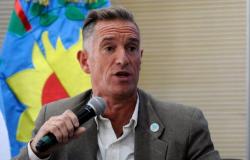Venice, Italy (CNN) — April 25 has long been a historic day in Venice: the date is not only the day of the Liberation of Italy, but also the feast of the city’s patron saint, Saint Mark.
But now Venice will get another dose of history to commemorate April 25, when the city became the first in the world to charge an entrance fee to visitors.
At the start of the day there were protests with citizens waving signs and holding their passports angry that the city was placed behind a barrier, as if it were a theme park or museum. Photos show police clashing with some protesters.
The much debated access contribution (it is called an “access contribution” instead of a ticket) began at 8 a.m. this Thursday. The city council is running a pilot project until mid-July to see if it can get the system up and running.

Starting April 25, visitors who only go to Venice for one day will have to pay a fee of five euros on certain days. Credit: Marco Bertorello/AFP/Getty Images.
Anyone visiting Venice as a tourist for a day, except those who live in the local Veneto region, must pay the 5-euro ($5.40) charge if they arrive between 8 a.m. and 4 p.m.
Overnight tourists do not have to pay, as the nightly tax is already added to their accommodation bills. However, they must also register their presence to request a fee waiver. Basically, anyone entering the city on the dates the fare is charged must carry a ticket or waiver. The only exceptions are residents of Venice and people who were born there.

People clash with police while protesting against the introduction of the registration fee to visit the city of Venice. Credit: Manuel Silvestri/Reuters.
Hundreds of citizens participated in a protest in Piazzale Roma, the road entry point to the city, although the exact number of protesters is not available. Protesters say that, at its largest, the group was 1,000 people, while authorities said only 300 attended.
A smaller protest took place near the main train station and Venetians confronted the mayor who was giving interviews to several television crews. That protest ended in a hug with the mayor, according to newspaper reports that captured the confrontation.
Ruggero Tallon, one of the main organizers of the protest and spokesman for the campaign group against Not Grandi Navi, told CNN that the group had planned to erect a banner reading “Welcome to Veniceland” and hand out fake “tickets” to tourists, but were stopped by police. Instead, they marched toward Campo Santa Margherita, one of the city’s main squares.
“We rebelled against the mayor’s idea of a closed city, a museum city,” Tallon told CNN.
“A fine is of no use. It does not stop the monoculture of tourism. This does not relieve the pressure on Venice. “It is a medieval tax and goes against freedom of movement.”
Tallon expressed concern that the project is being managed by a private company, which will receive people’s data, and suggested that other measures taken by the authorities, such as trying to return cruise ships to the canal and not yet restricting Airbnb, they are adding to the problem.
“On the one hand they do this and on the other they do everything possible to increase the number of tourists,” said Tallon, who called mass tourism a “global problem.”
“The only way (to move forward) is to repopulate the city: we have 49,000 inhabitants and there are more beds for tourists than for residents,” he said. “Let’s try to make it possible for people to live here. “Every house you live in is a house taken from tourism.”
Elena Gastaldello, president of Arci (Italian recreational and cultural association) of Veneto, who participated in the protest, stated that the ticket price will not control the number of people.
“The ticket will not impose limits on tourist access to Venice as no maximum number of visitors has been set, but it will further transform the city into an amusement park,” he told CNN by phone.
“This measure is not accompanied by specific urban development policies, rent containment and ease of finding housing. It doesn’t solve any problem.”
A spokesperson for the mayor’s office told CNN that 113,000 visitors registered on the first day, and about 80,000 registered in advance. Of that figure, 15,700 – a little more than 10% – paid for their ticket.
Of the exceptions, nearly 40,000 were hotel guests and about 4,000 were friends or relatives of residents. More than 20,000 travelers and 13,000 students entered the city. School groups were also counted.
The council said they inspected the credentials of nearly 14,000 people.
“It’s ridiculous”

Previously, more than 100,000 people came to Venice on some holidays, leading to scenes like this in 2017. Credit: Stefano Mazzola/Awakening/Getty Images.
The registration system highlighted residents’ housing problems: on the first day alone, 5,300 people registered to enter the city as second home owners. Venetian residents now number fewer than 50,000, and tens of thousands have been pushed out of the city to make way for second homes and Airbnbs.
In preparation for the first day, the city council spent the last few days setting up checkpoints outside the train and bus terminals, with separate lines for “residents” and “tourists.” Also, there is a booth outside the train station for newcomers to pay the fare or register an exception. Around 150 people have been hired to verify people’s documents and provide advice.
The fee will be charged for 29 days from now until July 14. After that, Venice Mayor Luigi Brugnaro said they will review how the pilot project has gone before deciding how to continue.
“No one ever did anything to regulate tourism and we believed something needed to be done,” he said in a statement on the first day of the project.

Many visitors will have to overcome new barriers. Credit: Marco Bertorello/AFP/Getty Images.
The fee has proven controversial among Venetians who fear it risks turning the city into a theme park and dislike the idea of having to register visitors.
As some locals prepared to protest the introduction of the fare, packed trains were arriving into the city from Milan and Rome.
The first tourists who encountered the checkpoints to enter the city did not seem fazed.
“I think it’s a good thing, I wouldn’t be deterred,” said Dominic Gagliano, a regular visitor to Italy from Scottsdale, Arizona, as he stepped off a train at the Santa Lucia station.
“I went to Cinque Terre last fall and it was just impossible. And we just arrived from Verona. I was last there in 2015 and a lot has changed. I think that, if you want to come to Venice, you are going to pay 5 euros to be here.”
Gagliano, who had booked an Airbnb, said the host had sent the link to request an exemption. The process was pretty simple, he said, other than having to call an Italian number to get confirmation. “I don’t understand why they didn’t just get an email confirmation,” he said.
Caroline Butler of Wilmington, North Carolina, also favored the measure.
“I went to Florence for the fifth time recently and I had to go out, there were a lot of people,” he said. “It was like it was the month of July.”
Canadians Denise Gomes and Brian Johnson of Ottawa said they had been aware of when the fee would be introduced, having heard about it on the news in their country. Their hotel had not informed them.
“I’m in favor of it; I suppose it will help pay for the infrastructure that will allow others to see Venice,” he said.
For Johnson, it is important that visitors contribute to the destinations they travel to.
“People go on a cruise and don’t spend a dime, but someone has to pay,” he said.
“We always try to inject money into the local economy,” Gomes said. “It’s really important.”
Citizens, however, were skeptical. Paolo Brandolisio, who makes oars and forcoles (Venice’s famous gondola oars), told CNN that he doesn’t believe the fee will help the city besieged by overtourism.
“They are not setting a maximum entry limit and today 80,000 people have booked. It is going to be a nightmare,” he said.
“What happens if they reserve 150,000 people and have to let them in? They say that people’s freedom must be respected, but that they must pay. It’s ridiculous”.
Brandolisio suggested incentivizing visitors to stay longer, offering discounts for longer hotel stays, for example, or simply limiting the number of visitors. Prioritizing the lives of locals is ultimately more important to preserving Venice, he added.
Achille Giacom, who held a one-man protest in front of the train station in the afternoon, said he was concerned about the data release.
“It is a measure of control over the population,” he said. “Data is just another resource. [La humanidad] “depleted the planet’s natural and human reserves, and now it wants our data.”
“Italians are usually the first to disobey, but with this it is as if they were hypnotized.”
— Barbie Latza Nadeau in Rome contributed to this story.




